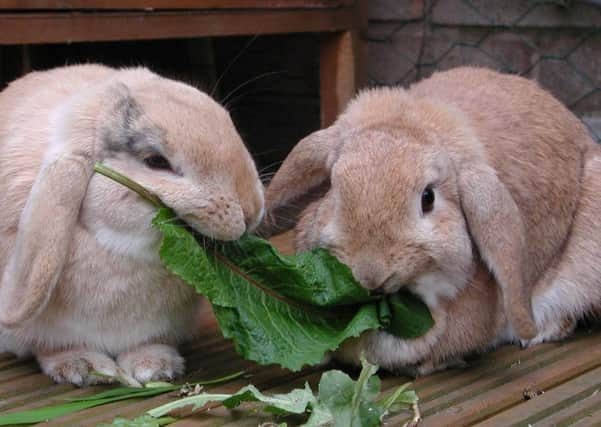Muesli is a no-no for your pet rabbit


The firm says industry research persuaded it to immediately cease the sale of rabbit muesli in all of its stores, and it has called on other retailers to follow its lead.
The theme of this year’s Rabbit Awareness Week (RAW) is Move Away from Muesli, which is about raising awareness around the dangers of selective feeding, encouraging owners to use a high-quality, hay based diet.
Advertisement
Hide AdAdvertisement
Hide AdA spokesman said: “Rabbits fed on a muesli diet are more likely to suffer from dental and digestive problems, and these health issues can have a detrimental effect on rabbits – so we haven’t sold rabbit muesli at Pets at Home for five years now.
“It’s great that RAW is continuing to draw attention to this issue and we hope that Move Away from Muesli helps make a real difference to the welfare of all rabbits, by ensuring they are fed the right diet to keep them healthy and happy.”
Earlier this year, Pets at Home suspended the sale and adoption of rabbits during the Easter bank holiday.
The firm has compiled a list of key factors to bear in mind if you are new to keeping rabbits -
Advertisement
Hide AdAdvertisement
Hide Ad* Rabbits are sociable creatures that can make wonderful pets for experienced pet owners, and are naturally social, intelligent and inquisitive animals
* Rabbits can become friendly and confident around people if gently handled from a young age
* Housing will take up a significant area of your house and garden - you’ll need to make sure they have a large area at home
* Initial set-up costs for their hutch and accessories can be expensive at first
Advertisement
Hide AdAdvertisement
Hide Ad* Rabbits have very distinctive personalities and, once tamed, love spending time with you and other compatible rabbits (rabbits should ideally live in pairs)
* Rabbits can enrich your children’s learning environment, helping them to understand more about animals and the natural world. They make suitable pets for older children, with adult supervision
* Rabbits take time to clean out, feed and health check every day
* Owners must consider the costs of vet bills, bedding and food costs throughout the rabbits’ lives and must be able to commit to these on-going costs
Advertisement
Hide AdAdvertisement
Hide Ad* Rabbits must also be vaccinated and neutered. It’s worth noting that unneutered rabbits can become aggressive when they mature and are prone to cancer of the reproductive tract – so neutering is not just to avoid unwanted babies
* A decision to get a rabbit should not be taken lightly - rabbits can live up to 12 years so are a long-term commitment
* Rabbits prefer the company of other rabbits – the temperament of any other pets you currently have, such as cats and dogs, should be considered when welcoming a rabbit into your home.
Rabbits shouldn’t be housed with guinea pigs as they have opposing diets and communicate in different ways.